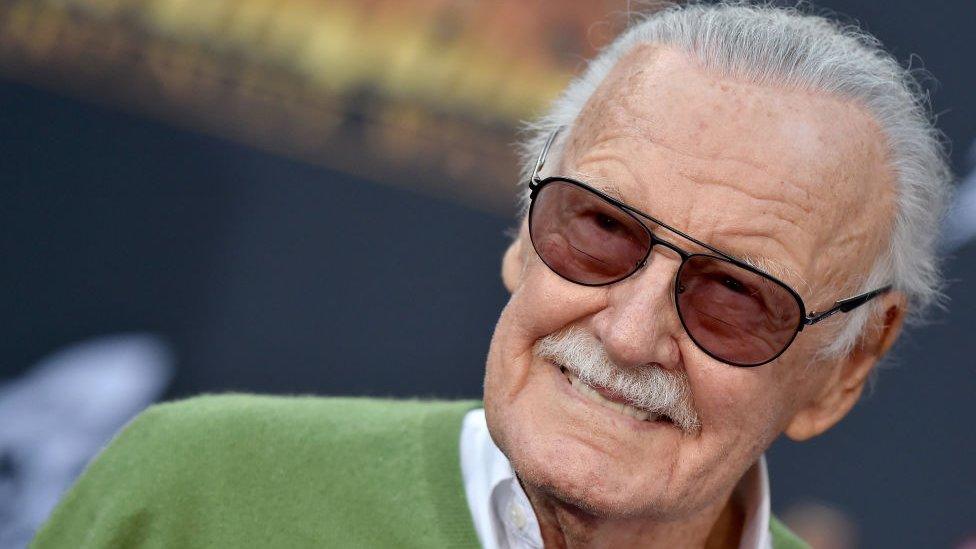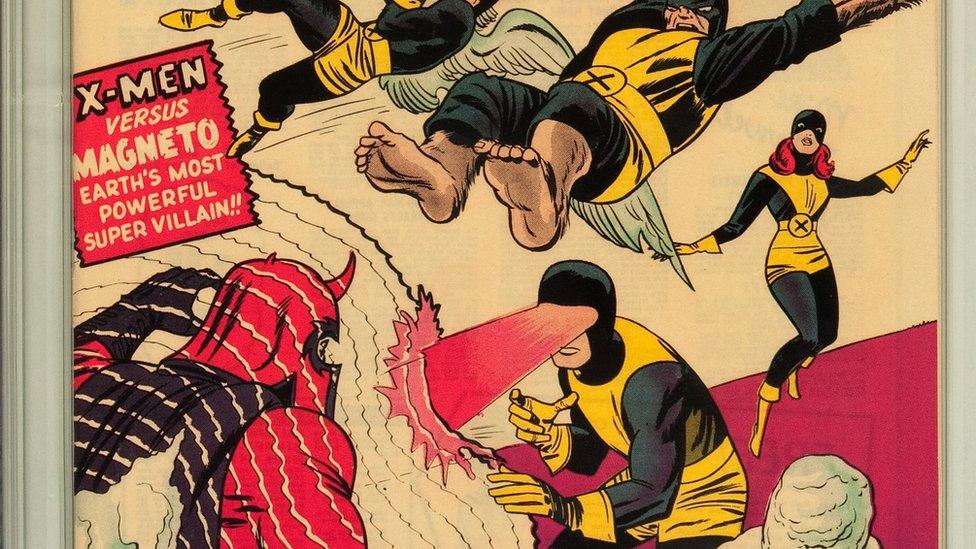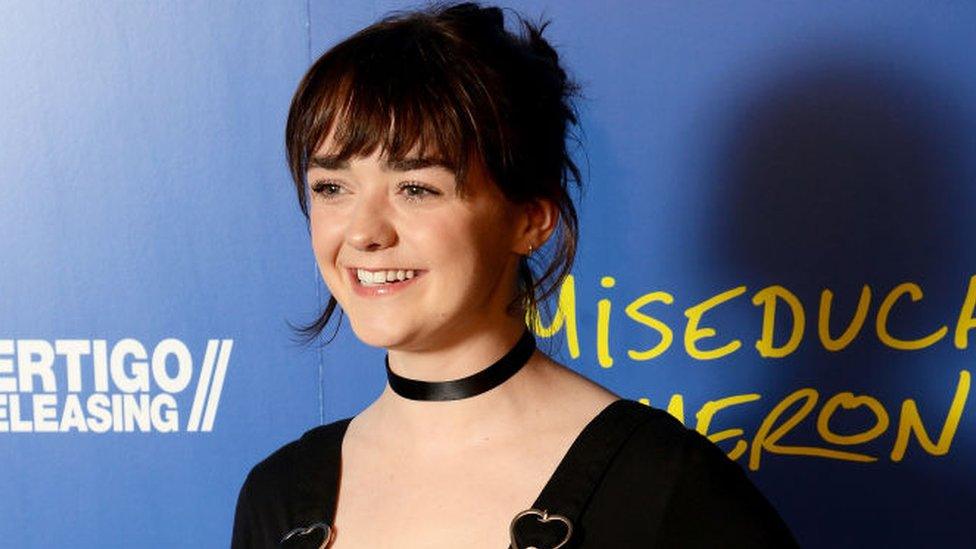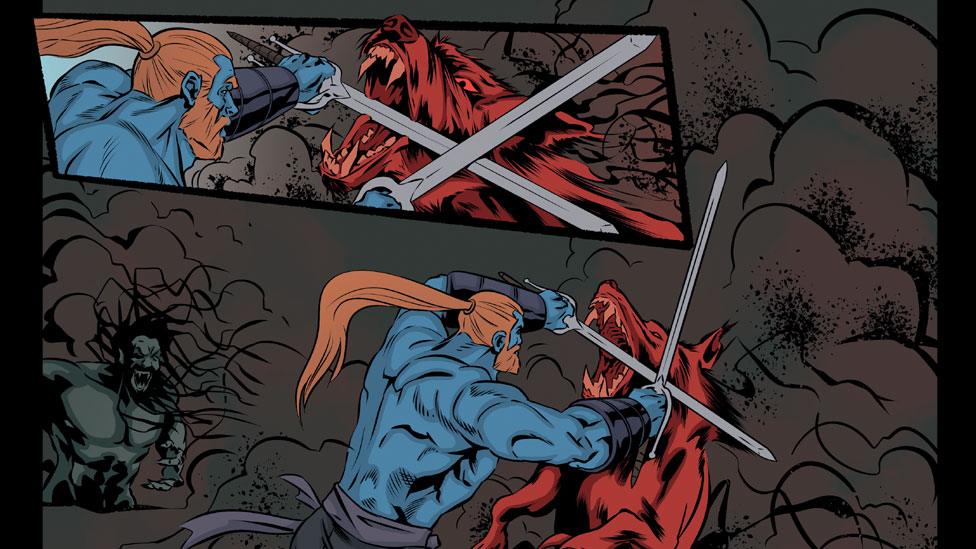How Stan Lee helped inspire Scottish storytellers
- Published

Lee because he created some of the most iconic comic characters of all time, including Spider-Man, the Avengers and the X-Men.
US comic book writer and former president of Marvel Comics Stan Lee died this week at the age of 95, but elements of his legacy live on in how he inspired Scottish comic book writers and their characters.
Many people know the name Stan Lee from his creation of some of the most iconic comic book names of all time, from Spider-Man to the Avengers and the X-Men.
Others might recognise his face, from cameos in almost every Marvel film. Lee left the Marvel company in 1972 but remained a chairman emeritus.
It's not often with a company as large as Marvel that one of the creators becomes such a well-known household name - Lee is almost as recognisable as the name Spider-Man.
He is known for creating compelling characters that people could relate to, as his comic book and storytelling ability inspired others to create.
X-Men characters Professor Xavier and Magneto were allegories for Martin Luther King and Malcolm X, while many fans have compared the gay rights parallel to the discrimination the X-Men often faced. Ian McKellan, who went on to play Magento in multiple movies once said that parallel was his reason for taking on the role.

The X-Men were first created by Stan Lee and Jack Kirby in 1963.
Lee had a fondness for portraying characters with flaws that the audience could relate to, such as the Hulk, possibly the strongest character in the Marvel universe, but that power, ultimately can not be controlled. Peter Parker, although gifted with his spidey-senses and superhuman agility and strength, was still a teenager dealing with normal teenager problems of negotiating homework deadlines and avoiding school bullies.
Although most fans know the Hulk and Spiderman, some of Marvel's less high profile characters have roots in Scotland, and while Scottish characters are still rare in US comics, Lee has helped craft and inspire other Scottish creators as well.
One of the first Scottish characters in Marvel given a prominent role was Dr Moira MacTaggert, a geneticist who made her first appearance in Uncanny X-Men in 1975. Although the character was not a mutant, she founded a mutant research facility called Muir Island, an island chain off the coast of Scotland and had a on-and-off relationship with X-Men leader, Prof X.
Moira has featured in multiple comics, and made two live action movie appearance, one with her native Scottish accent during X-Men 3, and again when she was portrayed by actress Rose Byrne in First Class, this time without the Scottish accent.
Allow X content?
This article contains content provided by X. We ask for your permission before anything is loaded, as they may be using cookies and other technologies. You may want to read X’s cookie policy, external and privacy policy, external before accepting. To view this content choose ‘accept and continue’.
Another popular character, and eventual X-Man is the mutant Rahne Sinclair, a powerful Scottish born woman who goes by the mantle Wolfsbane. Again, created by Chris Claremont, Rahne has the ability to turn her body into both a wolf and a werewolf and has been a featured member of the X-Men team for years. She has teamed with Wolverine many times during their run in X-Men spinoff series, X-Force.
She will be making her big screen debut in 2019 when she is brought to life by Game of Thrones actress Maisie Williams.
More recently Leo Fitz, one of the main characters on Marvel's television series S.H.I.E.L.D. is a Scottish born agent and scientist and there is even a Scottish Spider-Man called Peter Parquagh set in an alternative comic book Earth.
Not only did Stan Lee inspire other comic book writers to create Scottish characters within the Marvel universe, he worked with two of the biggest names in comics today.
Grant Morrison and Mark Millar, two Scottish born comic book writers have written Lee's characters in the past with great success.

The Game of Thrones actress with portray the Scottish hero in upcoming movie, The New Mutants
Morrison MBE is a comic book writer and playwright and had a successful run on New X-Men, which was also illustrated by fellow Scot, Frank Quitely. Millar MBE is best known for his work on Kingsman: The Secret Service, Wanted and Civil War.
Richmond Clements, a graphic novel writer from Northern Ireland, who has been living in Scotland for the past few years says "Scotland easily punches above its weight" in the comic world, but when it comes to US comics, Scottish characters are thin on the ground.
Clements said: "Alan Grant always enjoyed bringing Marvel and DC characters to Scotland, and jokes about how little American editors would know about Scotland.
"A great example of Alan's mischief can be found in one of his Nick Fury tales, where the Marvel superspy had a top-secret base on top of the Old Man of Hoy. I'm sure it was no coincidence that the artist on this story - Cam Kennedy - lives on Orkney."
Comics in Scotland have become more popular over recent years, there is even a Comics and Graphic Novels degree course at Dundee University and in Saltire, a graphic novel set in a mythological Scotland, the genre has truly come home.

Set in a mythological Scotland, Saltire is inspired by real life places and events.
Meanwhile Clements is currently writing his graphic novel which he described as "the most Scottish comic possible" - set to be released next summer. And Scots duo Gordon Rennie and Emma Beeby recently created the award winning Robert Burns Witch Hunter, which recasts the Nation's favourite poet as a crusader against the supernatural.
Clements thinks it is impossible to call yourself a comic creator, or fan, and not be in some way influenced by Stan Lee.
"It is not an exaggeration to say he is the most important figure in American comics ever - and there's a good argument to be made he's the most important figure in comics ever," he added.
"His characters have went from cheap, disposable comic books to now being the cornerstone of the biggest and most successful film franchise around. That is quite a legacy."